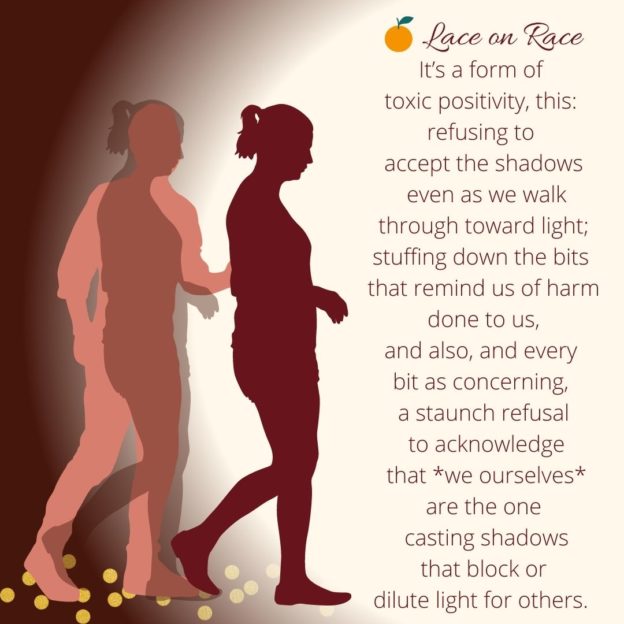I am honored to be a part of this year’s cohort of Supermajority, and one thing we are blessed with has been hearing from some powerful and impactful women.
Last week, one of these women was Hope Giselle, who I will be referencing for a future series; she packed so much into a 20 minute speech, and I was and have been thinking about what she said, and its implications for Lace on Race for days now. It was like her remarks were directed right at our community.
We’ll be talking more about Hope Giselle later–but right now I want to pull a piece of my impressions of what she said as we revisit and re-confront this piece published by me over a year ago, and which I was surprised that, at the re-read in preparation for this commentary, made me weep.
I think Hope Giselle watched “Queen and Slim” because as she spoke, visceral images flashed back at me. The following are some of what I took from her message:
‘Courage is key; it means choosing to face violence (this is not an endorsement of violence)
We choose violence–or perhaps better said, we choose the acknowledgement of violence– by existence
To be unwilling to look violence squarely in the eye gives violence power
Choosing the violence means telling yourself the truth about violence against yourself and others
Acknowledging your own capacity for violence and whether or not you are mindful of it is a painful, but absolutely crucial element
Always choose to be your most courageous and brave self–darkness and all.
We do our damndest to run from all of the above. It’s a form of toxic positivity, this: refusing to accept the shadows even as we walk through toward light; stuffing down the bits that remind us of harm done to us, and also, and every bit as concerning, a staunch refusal to acknowledge that *we ourselves* are the one casting shadows that block or dilute light for others.
In the work of racial justice, this cannot be so.
Again, courage. We need to face the bad actors hiding in sketchy alleyways in our own psyches and souls. They will not go away if you walk more quickly; the residue of harm endured by each of us must be confronted, else that harm will be displaced, but that is exactly what we do. So these actors, this residue, gets neatly sidestepped (not really, but it feels like it sometimes, yes?) and shunted off and shunted off, and then there are those who have legions of psychic muggers but who have no one else to fob them off too. Privilege is found in how we slide.
Facing your perpetrators, and would be perps, and acknowledging the harsh fact that for some, whether by action or inaction, or by way of the artful slide, that *you* are the mugger; you are the instigator, *you* are the antagonist, takes rigorous courage.
This is exactly when so many people, those new to the LoR community, and seasoned walkers alike, find the exit.
They find the exit, and think they left the bad actors behind. And in some real ways they did–deploying the art of the deflect and the dodge.
Demons, until they are defanged, will indeed find a host.
As we consider our individual and collective walks toward racial justice we have to, we have to ask ourselves what pain we leave in dark alleyways for others to face and endure. We have to ask ourselves how we profit from roadblocks that prevent others from escaping the alleyways from which we make sure we are safe.
We need to ask ourselves who indeed pays the cost of the sunny medians filled with flowers; the only things that we allow ourselves to see and to experience.
Part of being a person who stands for and with is authentically, reliably, relentlessly choosing to do our own work, which demands not outsourcing our own pain and residue.
One can still cast shadow on those forced to endure what you refuse to, and sometimes, oftentimes, that which you choose to collude, even while standing in the fragrant median; the oblivious middle.
The choice is in itself, yes privilege. But the choice is everything.
Queries:
*How does it land with you when considering how loving requires a certain sort of death? Death of what? Is this an encouragement? Or do you approach this concept with trepidation?
*How have you ran from, or sidestepped your shadows? How have you displaced them, by kicking the can down the road? Who then is forced to shoulder the burden?
*The idea of facing one’s shadow as a radical anti-racist practice: how does this tie into our work here?
Past post “Sometimes, To Move Toward Love…Means To Move Toward Death”
Join us in The Bistro for the discussion.
Lace on Race › Forums › Commentary for ‘to choose love is to choose death’
-
CreatorDiscussion
-
May 27, 2021 at 3:37 pm #9969
-
CreatorDiscussion
-
AuthorReplies
-
May 27, 2021 at 6:29 pm #9977

Laura BerwickMemberSomething from the original post struck me differently today. The part where, Lace, to paraphrase, you talk about turning your eyes from the kool-aid blood on the screen when you yourself live drenched in blood.
I think about how blood permeates us, and is our life essence, and how we retch over it or decry it when it’s outside of its capsule, but don’t notice or value it so much when it’s where it’s supposed to be, doing what it’s supposed to do. In the vessel, it’s taken for granted. Outside of the vessel it evokes disgust or pity or generally something negative. In a way we all live drenched in it, in that it’s an inseparable part of our selves, and when it is separated, we die, but it… in some ways it doesn’t disappear. It saturates those around us. To me, it’s like you say above, a shadow we don’t look for in ourselves and don’t want to acknowledge that we cast (or spill). To confront your questions…
*How does it land with you when considering how loving requires a certain sort of death? Death of what? Is this an encouragement? Or do you approach this concept with trepidation?
I think loving requires the death of ego and independence, and that has been hard for me. But it’s also liberating to learn I’m not alone. I think it’s both encouraging and frightening. I don’t know that I will ever approach the kind of loving required of me here with unmitigated joy. But I will still do the thing. I’m committed to be in community here even when it’s not what my ego and independence want. Even when I feel fear at what I have to give up to do what’s right.
*How have you ran from, or sidestepped your shadows? How have you displaced them, by kicking the can down the road? Who then is forced to shoulder the burden?
In some ways, showing up here every day, checking the box of the minimum expected of me, that’s something I could technically do without giving of myself, without being known as Marlise put it. Approaching my work here that way allows me to tell myself I’m doing the thing while avoiding any sort of learning or becoming or harm-reduction. I try not to do it that way. But I have to be aware that I could, and have to choose not to. If I think, well, some day I’ll do it better, or, I’ll do more when I think I know how better, that’s just pushing down the road what I need to do NOW. And it’s critical that I start now, because I’m likely to encounter Black and brown people between now and “then”, should “then” ever come. And any Black person or person of color that I encounter will shoulder some burden of me if I’m not aware of how I lean on them. My friends may forgive and pass it over, but I don’t want to be a weight on my friends.
*The idea of facing one’s shadow as a radical anti-racist practice: how does this tie into our work here?
To me this ties into… recognizing that I cast a shadow by being. I… can never NOT cast a shadow as long as the light flows a particular way. It’s a fantastic analogy, if the light is privilege. Privilege comes from a limited source, my whiteness. If Privilege came from all around, and fell on everyone equally, I wouldn’t cast a shadow. But that’s not the case. So, I can try to use my privilege like a flashlight, so that it flows kind of through me to others, and I’m not blocking the benefits, like by financially engaging here and elsewhere. I can try to make myself small and stay out of people’s way, follow how Black leaders lead me and do what they need, to try to minimize how I block it. I can be active in helping put up more lights, vote for people and policies that seek to further racial equity.
-
May 28, 2021 at 10:58 am #9985

Rebecca McClintonMember“I am committed to be in community here even when it’s not what my ego and independence want. Even when I feel fear at what I have to give up to do what’s right.” Yes, this. Anti-racism is a moment by moment choice I made to intentionally put aside that ego, independence, and fear knowing those things definitely make me less safe for those around me and also don’t really serve me much either.
Thank you as well for that reminder that I can never NOT cast a shadow, and instead of stopping there noting how that light can be used instead.
-
May 30, 2021 at 9:21 am #10038

Emily HolzknechtMemberThank you for pointing out that doing the minimum, checking the box, is a form of kicking the can down the road. The minimum is the same for everyone so it can’t be our full capacity.
-
June 12, 2021 at 9:31 pm #10303

Julia TaylerMemberI’m glad you referred to the original post. I missed it above and hadn’t seen it before. The kool-aid blood was a vivid description.
-
-
May 28, 2021 at 10:52 am #9984

Rebecca McClintonMember<font size=”4″>
How does it land with you when considering how loving requires a certain sort of death? Death of what? Is this an encouragement? Or do you approach this concept with trepidation? </font><font size=”4″>Loving does take a death of sorts to put what I want aside and listen with whole heartedness, especially when that engagement is around something I’ve done towards others that’s hurtful or that I need to repair. How do I feel about this death that’s required? I notice some binary thinking at first that it somehow means my wants don’t matter and notice some defensiveness with that. That thinking and those emotions represent my adaptive teenage responses to my growing up that are no longer helpful, useful, or needed. Of course my wants matter (if I don’t recognize that I will be quick to offend from the victim position and to give rise to resentment), but in order to put others first I have to immediately know that connection with those in front of me means being intentional and willing to set some of what I want aside right off (it’s not a matter of safety anymore, teenage self’ time to set aside. If anyone, it’s the person in front of you that’s not safe now!). The gift that comes in doing that is communion, connection, and trust, something WAY more meaningful (intimacy with another) than whatever my silly wants (or defenses I didn’t want to let go of) were at the onset. </font>
<font size=”4″>How have you ran from, or sidestepped your shadows? How have you displaced them, by kicking the can down the road /Who then is forced to shoulder the burden? </font>
<font size=”4″>Withdrawl and naval-gazing is definitely one I tend towards (‘I’ll never be good enough’ ’they’ll never listen to me or care anyway’, ‘what I do won’t matter or make a difference’…hmmm, sounds like that teenage self again). Another is ‘I didn’t know better’ (which now I know means ‘I didn’t choose to learn/know better’). Both of those directly put the burden on others (in this case people of color) to take care of my discomfort. I was at an online LGBTQ+ training one day this week and the keynote speaker was the supreme court justice in my state who is also a Black lesbian, woman who experiences disability. She said a couple things that relate to the burdens of this shadow self I described. She said, “no more excusing bias by calling it implicit,” and “your discomfort is your own burden to bear (not mine)”. </font>
<font size=”4″>The idea of facing one’s shadow as a radical anti-racist practice: how does this tie into our work here? </font>
<font size=”4″>There’s no way I can be safer for Black and Brown people around me without facing squarely the aspects I described above inside of me. They also get in the way of community here. I have to be ready and committed to leaning into those to build authentic and eye to eye connection with others. </font>
-
May 29, 2021 at 9:12 pm #10032

Jen ScaggsMemberI didn’t even think about the death of our defensiveness and typical responses when we have done something hurtful. That is definitely a necessary death. And you are so right, what a gift we get when we can lower our defenses and truly connect in a positive way with others.
-
May 31, 2021 at 2:19 pm #10065

Shara CodyMemberDeath of defensiveness and of what I want to create connection are so important one in this work. I feel like most of the “deaths” that need to occur are all tied to the death of centering. I identify and stop centering behaviors and feelings in myself everyday as I walk.
-
-
May 28, 2021 at 5:04 pm #10027

Meg HanebuttMemberHow does it land with you when considering how loving requires a certain sort of death? Death of what? Is this an encouragement? Or do you approach this concept with trepidation?
I have often feared death but am learning that death just means an ending, at least in this context. And that endings are essential for new beginnings to emerge. It’s still scary, especially because the “of what” part is still unknown, as is the emerging outcome. I definitely approach it with trepidation, although I’m learning to trust it.
*How have you ran from, or sidestepped your shadows? How have you displaced them, by kicking the can down the road? Who then is forced to shoulder the burden?
I am cross-posting and summarizing this reflection from the original post, but I have side-stepped shadows by not looking directly into the eyes of my own white supremacy. For example, I’ve not listened to certain podcasts or read certain books on the psychology of white supremacy, for fear of what I might actually find there (things that I relate to? Things that I’ve said, or done, or thought?) By kicking that can down the road, I force Black and Brown individuals and communities to shoulder the burden, because my own white supremacy seeps out from underneath the barriers that I’ve put up between myself and the aspects of my own psyche (in my white family members, friends, partners, community members).
*The idea of facing one’s shadow as a radical anti-racist practice: how does this tie into our work here?
I need to think about this more, but I suspect that it is that we, by walking here, shoulder to shoulder, are practicing looking at our individual and collective shadows more regularly, more routinely. We are practicing facing our shadows here, in a supportive and radically honest space, so that we can more swiftly and adeptly face them in service to our North Star.
-
May 29, 2021 at 7:47 am #10029

Shara CodyMember@MegNH what you said about avoiding certain things for fear of what you might find there makes me think of the times when I recognize something someone else does or says as something that is also in me. I usually have one of two reactions to this: 1) letting them know or saying it aloud to myself that I relate to that as well or 2) an internal thought that usually starts with “blargh” at myself knowing I do that too but feeling a lot of resistance and the desire to avoid it. When it’s #2 I know there’s lots of harm wrapped in that resistance and I need to spend some time looking at it.
Since walking here at LoR I have what I think is a good amount of both in that I’m getting better at admitting my road blocks and sharing with others but that I’m continuing to encounter more blocks and resistance to root out. Something that’s really helped me is seeing that others are struggling with similar things at LoR and how others still move while facing them. Glad to be walking with you ?
-
-
May 29, 2021 at 7:22 am #10028

Shara CodyMember*How does it land with you when considering how loving requires a certain sort of death? Death of what? Is this an encouragement? Or do you approach this concept with trepidation?
You have to let go of anything holding you back so it’s death as in letting go in order to move forward. The death is of traumas, beliefs, behaviors, excuses that don’t serve you and the North Star. This is an encouragement and I don’t feel hesitation or nervousness about facing it.
*How have you ran from, or sidestepped your shadows? How have you displaced them, by kicking the can down the road? Who then is forced to shoulder the burden?
I ignore them until they get too big and start tripping me and I’m forced to look at them again. But then I probably just pack them away until next time again and they spill out onto people around me and especially onto BIPOC before I finally trip on them and do something.
*The idea of facing one’s shadow as a radical anti-racist practice: how does this tie into our work here?
If I can’t look myself in the eye how can I actually see others eye to eye? Things I don’t face within me I wield against others which will inevitably land on BIPOC and cause harm.
-
May 29, 2021 at 10:15 pm #10034

Rebecca McClintonMemberah yes, I’ve done that too…waiting until things are ‘too big’, or ‘too obvious’ to start addressing them rather than right off when they first happen. Something small can grow insidious fast. Making excuses about not addressing things sooner doesn’t serve me and certainly doesn’t serve the safety of those around me.
-
May 31, 2021 at 2:13 pm #10064

Shara CodyMemberI’ve been facing lately that I need to be dealing with things everyday instead of even waiting till there’s a thing (prevention) so that I can be reliable and steady in making the world safer for BIPOC.
-
-
-
May 29, 2021 at 8:57 pm #10030

Jen ScaggsMember“To be unwilling to look violence squarely in the eye gives violence power”
I was struck by this quote from Hope Giselle in light of some discussion on one of my comments a couple of weeks ago here. It brings to mind again that softening language when calling out racism is not looking it squarely in the eye, and it is in turn giving it more power.
*How does it land with you when considering how loving requires a certain sort of death? Death of what? Is this an encouragement? Or do you approach this concept with trepidation?
I definitely see how society reacts and shows more love for Black people and equity when a Black person is killed. It isn’t right and we should show that love all the time and work for equity all the time. But as white people, to love Black people and to call for racial equity means to call for the death of white supremacy and all of the privileges it gives to us. I don’t fear the death of white supremacy, but I do sometimes fear the reactions of others who are willing to fight to keep it alive. Living in a small rural town, I’m often afraid to make my feelings on the matter known.
*How have you ran from, or sidestepped your shadows? How have you displaced them, by kicking the can down the road? Who then is forced to shoulder the burden?
I haven’t been the kind of person to speak up, especially in family discussions when things like racial issues come up. This puts the burden on the next person to interact with them or the next Black person affected by their racist ideas.
*The idea of facing one’s shadow as a radical anti-racist practice: how does this tie into our work here?
We all have shadows whether they be racist ideas we inherited from our families or just things that we have absorbed from society as a whole. We all have bias that we need to confront and identify so that we can actively work against it.
-
May 29, 2021 at 10:25 pm #10035

Rebecca McClintonMemberThank you for that reminder about “softening language” and how harmful that can be.
I too, have struggled with speaking up in extended family discussions outside of my household. I like how you point out the burden this puts on the next Black/Brown person they interact with. I have found it helpful imaging this community also there present with me at those events/in those living rooms as a helpful nudge, and wanted to offer that to you. It’s easy for me to feel alone in those moments, and then to use those lonely feelings as an intentional excuse to not speak up.
-
June 12, 2021 at 9:35 pm #10305

Julia TaylerMemberThe reminder about the softening of language was a good one for me too. I have a tough time with my immediate family (husband) and I have to be careful about how I interact with him. There are also some “friends” who I have had to be the bad guy (in their minds) and tell them that their jokes aren’t funny etc.
-
-
May 29, 2021 at 9:02 pm #10031

Jessie LeeMemberHow does it land with you when considering how loving requires a certain sort of death? Death of what? Is this an encouragement? Or do you approach this concept with trepidation?
I’m reminded of Radha’s Thunderbolt piece, which was the first time I’d considered that my ego would need to die before I could love others in community, before my mind could shift from always thinking in terms of “I/me/my” to “we/us/our.” This is an encouragement. The process is scary because there’s some risk involved, but it’s so necessary and worthwhile.
*How have you ran from, or sidestepped your shadows? How have you displaced them, by kicking the can down the road? Who then is forced to shoulder the burden?
I’ve run from and sidestepped my shadows by refusing to view myself with humility, which I’ve heard defined as no better and no worse than I truly am. I beat myself up and apologize for not being good enough, which is really a way of sidestepping accountability for my behavior. If I’m spiraling in toxic shame, I’m not learning or changing; I’m digging my heels into the grooves of my harmful patterns rather than doing the work to replace them with new patterns. Then I slosh that mess on Black women when my speech and behavior cast me as helpless, hopeless victim and them as Mammy.
*The idea of facing one’s shadow as a radical anti-racist practice: how does this tie into our work here?
I can’t change patterns that I refuse to observe honestly. Our work here is to personalize, to face the ways I’ve caused harm already and the potential I always carry with me to cause more harm. When I do this, it demands my entire life to change.
-
May 30, 2021 at 9:37 am #10039

Emily HolzknechtMemberWhen I look at the tile that needs to be fixed in the shower and say to myself “oh, it’s fine!” I am delaying dealing with the repairs that need to happen. When I do not see myself clearly and my shadows clearly, I am doing the same thing.
-
-
May 30, 2021 at 8:51 am #10036

Emily HolzknechtMemberI am thinking that loving requires a sort of death of individual freedom. Because when you love another person, you give up the ability to choose what’s best for you without considering anyone else. Often you then set aside what you want most because that is not in the interest of the person or people you love. This is both an encouragement and a trepidation. I do think that if I had no love for any other person, then I would get really detached from reality while at the same time thinking I hold knowledge of what’s best. It is through loving relationship with other people, through the loving community that I orient myself. Without others I would be without orientation and therefore lost. The trepidation is because part of me wants to be selfish and self-oriented and is also afraid that I will betray those I love by choosing self anyway when I should choose love.
I think I have run from my shadows by shifting the blame for who is casting them to other people. I have also explained them away without blaming others. When I do that, often people I love are forced to shoulder the burden. And also in the bigger picture, when I run from my shadows of my participation in white supremacy, Black and brown people are forced to shoulder the burden.
Facing one’s shadow is a part of our work here at Lace on Race that many people who are new to the community do not expect. I did not expect it when I first followed Lace on Race or when I first commented. Previously I had studied the history of racism or discussed current events and shown disgust at the behavior of others. I had never studied myself though and how I fit into these systems and contributed to them and enabled them. When Lace asks us to personalize, she is asking us to face our shadows. And that is what has contributed to the most change for me as I see it.
-
May 30, 2021 at 11:16 am #10040

Grace BannermanMemberHow does it land with you when considering how loving requires a certain sort of death? Death of what? Is this an encouragement? Or do you approach this concept with trepidation?
Frankly, the idea of choosing life affirming actions and choosing love requiring a certain sort of death, or acceptance of risks of death, scares me because I don’t know if I’m capable of it. I’m lucky that it’s not a direct and literal question for me. I can work to live out my values in different ways each day, practice giving up different things when necessary and become more accustomed to that practice, and see where that takes me. In terms of a metaphorical death, like the replacement or redirection of certain habits or behaviours of parts of the self, being willing to change and trying to change oneself radically and durably, that seems desirable.
How have you ran from, or sidestepped your shadows? How have you displaced them, by kicking the can down the road? Who then is forced to shoulder the burden?
Usually distraction and procrastination, avoiding conversations that I think will be difficult with myself and others. That choice to avoid uncomfortable things without immediate or obvious negative consequences for my life is a huge privilege that many Black and brown and racialized people don’t have. They may be forced to shoulder the burden that I avoid if they interact with people who I didn’t even try to talk with about racism. I also have to ensure I’m honest with myself about what areas I need to work on and what areas aren’t as urgent instead of self-flagellating indiscriminately and unproductively.
The idea of facing one’s shadow as a radical anti-racist practice: how does this tie into our work here?
Facing one’s shadow as a radical anti-racist practice seems like it is the work here – learning relational tools to hold oneself well in order to hold others well. Learning the tools required for white people to even be able to have conversations about race. As a white woman, this means that as I learn relational tools, I use them in my personal relationships with Black and brown people and apply them in my thinking and work on the macro scale i.e. of policies, laws, access to services and experiences using them.
-
May 30, 2021 at 9:58 pm #10055

Vicki van den EikhofMemberThis piece is so thought-provoking for me.
How does it land with you when considering how loving requires a certain sort of death? Death of what? Is this an encouragement? Or do you approach this concept with trepidation?
If I am truly committed to becoming the person I say I want to be, I will die a thousand tiny deaths every day. I’ll bite my tongue instead of saying the sarcastic criticism; I’ll make dinner for the family when I’d rather be doing something else; I’ll drag myself out of bed and go on a walk with the sunrise when my bed is so warm and comfy and I’m so tired; I’ll listen to understand instead of to reply; I’ll stay up late listening to my young adult children share their concerns (these convos only happen after 10:30pm for some reason), even when I know I have to get up early the next day; I’ll drop what I’m doing to help a friend. I’ll recognize that the story I’ve been telling myself doesn’t reflect reality as well as I thought, and I’ll work on a more accurate one, even if it’s painful. And yet, I can do all these things with the wrong attitude or intention, and in that way, still preserve my own sense of entitlement or superiority. The death of ego involves profound humility that I struggle with constantly.
How have you ran from, or sidestepped your shadows? How have you displaced them, by kicking the can down the road? Who then is forced to shoulder the burden?
One way that I try to run from my own shadow self is by having that attitude. “I worked so hard making this dinner and it was so inconvenient. I hope you’re all happy.” Or variations of that. Complaining. The effect is that whoever is eating it is made to feel responsible for my emotions. It’s their fault I’m tired, or inconvenienced. This makes them feel less important or valued.
The idea of facing one’s shadow as a radical anti-racist practice: how does this tie into our work here?
There is a very direct pivot to racial justice work, here. I can do the work, and then have an attitude that requires others to acknowledge my efforts, to do extra work to make me feel better, making my needs a priority–or I can do the work, while prioritizing the needs of those who have born the brunt of the hierarchical nature of our society for over 400 years.
-
June 1, 2021 at 2:16 pm #10076

Christina SonasMemberMy BFF and I have a shared praxis that says: “My mind is a dangerous neighborhood; I never go there alone!” I know that whatever I am working on, she is there with me — in spirit always, in actuality if I need her to walk with me. To be human is for the spirit to endure indignity, violence, depravity… no matter who we are or where we are. To be human is to have an animalistic core, the reptilian brain, giving us the capacity to inflict indignity, violence, depravity… a capacity no one is strong enough to resist universally. So I grow and train myself to endure what is given, and to resist with greater reliability.
*How have you ran from, or sidestepped your shadows? How have you displaced them, by kicking the can down the road? Who then is forced to shoulder the burden?
I obscure and avoid my shadows with rationalizations: It was okay for me to do that given the circumstances. The other person did it. Only action matters, so passive benefit is fine. As long as I’m doing good work most of the time, any actions with negative impact get a waiver. When I’m not connected to my shadows, they’re free to roam, impishly or malevolently, and wreak havoc on the lives of everyone from my partner and kids, to BIPOC USAns, to the international community of Black and brown people.
*The idea of facing one’s shadow as a radical anti-racist practice: how does this tie into our work here?
My shadow is me – it does what I do. If I am becoming antiracist, my shadow needs to come along with me, otherwise I go along with it. I need to examine the ways that I am personally participating in the shadow of racism and exploitation — the ways that my shadow reveals to me what I am actually doing — so I can bring myself into ethical praxis and honest integrity.
*How does it land with you when considering how loving requires a certain sort of death? Death of what? Is this an encouragement? Or do you approach this concept with trepidation?
Everything I do involves endings — deaths — of all the things I didn’t do at that moment. Loving is no exception. While those deaths can be incidental to the path I choose — doors that I walk past — often I will (or need to) deliberately choose the death of something in order to proceed. I’ll walk along, and there will be an open door that I must choose to close. In loving, I need to close the doors to losing strategies of relationship; to my self-concept as a universally good person; to attitudes like “be nice” or “respect elders” or “honor privacy” which allow harm to perpetuate. So I’ll invite death to walk with me to those doors and to assist me in closing them.
-
June 7, 2021 at 11:41 pm #10221

Rhonda FreemanMemberI am inspired by these responses and what comes up for me is the death of the belief in my deserving. I ‘deserve’ to have a good job. I ‘deserve’ to have good salary. I have worked hard for what I have. I share. I am thinking tonight of how the word ‘deserve’ drips with white supremacy and how it comes up in mind so very, very often. At best, I must add if I ‘deserve’ all of this, doesn’t everyone else? If not, why not? Pivoting to race, don’t brown and black people and indigenous people ‘deserve’ reparations? Yes, I need to consider the death of ‘deserve’.
-
June 8, 2021 at 1:45 pm #10222

Marlise FloresMemberHow does it land with you when considering how loving requires a certain sort of death? Death of what? Is this an encouragement? Or do you approach this concept with trepidation?
Death of being right, of being alone, of being comfortable. I don’t approach it with trepidation as much as not knowing how. There are so many patterns of self protection and preservation (that ultimately end in being alone in a desert) that I have to unlearn over and over again.
*How have you ran from, or sidestepped your shadows? How have you displaced them, by kicking the can down the road? Who then is forced to shoulder the burden?I displace by being swallowed by my shadows. Overwhelmed and shut down. Which ultimately still displaces the burden on everyone else.
*The idea of facing one’s shadow as a radical anti-racist practice: how does this tie into our work here?Racism is self preservation by devouring others. It is cannibalism, and it ends in death….but not the death unto self that invites life through being whole with others. It is a death of the soul. Facing my shadow means recognizing and accepting those parts so that I can then mitigate harm to others.
-
June 12, 2021 at 9:41 pm #10306

Julia TaylerMember*How does it land with you when considering how loving requires a certain sort of death? Death of what? Is this an encouragement? Or do you approach this concept with trepidation?”
I think we all tend to be afraid of death. But looking further I think there are things in my life that need to die. Beliefs, excuses, habits. They need to be rooted out so I can love the way I want to. To be courageous and the person I want to be. I’m looking forward to growing.
*How have you ran from, or sidestepped your shadows? How have you displaced them, by kicking the can down the road? Who then is forced to shoulder the burden?
I have certainly sidestepped conversations I should have had. Jokes that people said that were hurtful. Ideas that were harmful to others. I’ve wanted to avoid the frustration of knowing that most of them won’t change. But as someone mentioned on another post that’s not the point. Planting seeds. I can’t make them grow but I can plant them.*The idea of facing one’s shadow as a radical anti-racist practice: how does this tie into our work here?”
We need to face our white supremacy and confront it. I need to look at my shadow, confront it and then make the changes necessary.
-
June 23, 2021 at 10:02 pm #10427

Shannon Brescher SheaMember*How does it land with you when considering how loving requires a certain sort of death? Death of what? Is this an encouragement? Or do you approach this concept with trepidation?
As a Christian, this really lands in me with the call to have a death to selfishness and the prior self. It’s an encouragement. Loving requires looking straight in the eye and dealing with the messy, awful parts of us and our history that further injustice. It requires killing those bad assumptions, the myths we hold on to about our own personal and cultural histories. I think that’s one reason white people are so terrified of facing a history different than they were taught in school – it requires letting go of and in some ways killing, stories that they have believed (about themselves in part) since they were kids.
*How have you ran from, or sidestepped your shadows? How have you displaced them, by kicking the can down the road? Who then is forced to shoulder the burden?
I think the times I’ve sidestepped them was when I refused to believe that I was part of the problem – that I was a good person and therefore race didn’t matter. I know that had ripples through my volunteering and activism at the time. That my lack of self-awareness made my fellow volunteers – most of whom were Black – deal with the violence and damage I did while I denied it.
*The idea of facing one’s shadow as a radical anti-racist practice: how does this tie into our work here?
Understanding and acknowledging our own role in and potential for violence is such a key part of this work, especially for white people. Otherwise, we’ll keep slipping back into those patterns too easily without even realizing it. I know the two things that have helped for me is examining my own assumptions and paying attention to when I fall into really dreadful thought patterns. It’s so easy to let split-second assumptions just go by without examining them, but they reveal so much about what really lies beneath our actions. If my first assumption is that a Black person is dangerous or “doesn’t belong here” – even if I know that is wrong intellectually – it will change my immediate reactions to things. Similarly, nasty thought patterns arise when I’m super stressed. They come up most when I’m running because I’m physically exhausted and pushing myself hard. So I acknowledge them as something I know is buried in my subconscious – even if it’s not something I would choose to or want to think – and then make the effort to mentally correct it.
This also harkens back to the whole discussion around trauma and how facing it (or not) can further violence. If we can’t and don’t grapple in a healthy way with trauma we’ve had in our lives, we repeat it. Maybe not with our families (although that often), but in our relationships and particularly towards people with less power than us. Often, that violence – whether physical or mental – is racist. The shadows will overcome you and you will spread them to others if you do not recognize and learn to handle them.
-
July 8, 2021 at 3:30 pm #10564

isa hopkinsMemberThe original post hit me deeply; I’ve been thinking a lot lately about memorialization, and how it valorizes death. Specifically Black death, in the context of memorializing Black people killed by the state — but on a personal level I’ve been considering it in the context of a cousin of mine, who died of an opioid overdose over a decade ago. We were very close (I have his initials tattooed over my heart), and he was a complicated kid who was frequently in trouble with the law. I loved him dearly and in the eulogy I gave at his funeral I strove to capture all of that contradiction, not to flatten him into something two-dimensional just because that made him “easier” to mourn. And so the tendency towards memorialization and sentimentalization of those who are murdered by police — I see the comfort of talking about an “angelversary” instead of an anniversary of murder or of death. But: my cousin was not an “angel” in his life, he was a person; and I refuse the idea that his early death was any kind of moral “improvement,” that a violent end at a very young age makes anyone “angelic.”
And the same is emphatically true for all the Black folks murdered by police, or killed by structural racism that left them uniquely vulnerable to Covid. Celebrating life requires us to, as Hope Giselle instructs us, look it squarely in the face. Not to sentimentalize. Not to render premature death as redemption. Such efforts seek to make sense of violence, to find value in suffering. But “value in suffering” is a way of justifying that suffering. Of justifying the violence of white supremacy. So I think we must resist it, politically; even if such strategies might be necessary, personally. I am not here to tell any grieving Black parent or child not to call it an “angelversary” if they find comfort in the term. But indulging in comfort rather than truth is what white supremacy does so relentlessly, and the way that so many folks are so eager to borrow grief that isn’t theirs, that isn’t ours, in order to excuse our own culpability… well, it’s just the latest rendition of white exploitation of Black trauma; it’s nothing new, and to use the suffering of others to soothe our own consciences is its own violence to confront.
*How does it land with you when considering how loving requires a certain sort of death? Death of what? Is this an encouragement? Or do you approach this concept with trepidation?
This question has me thinking about bell hooks, in “All About Love” — she discusses how actually understanding the full multidimensionality of love is incredibly difficult, because it forces us to confront the lovelessness that most of us known throughout most of our lives. Because most our relationships… are not deeply loving. Even those that include parts of love; even those where the intention to love was always present; even those that society tells are *inherently* loving (eg mothers) — and to recognize that is deeply destabilizing. (It’s also not, as hooks makes clear, an accusation against anyone; most all of us lack the skill to love well because we live in a world that militates against it at every turn, not because we are “bad” people.)
And reflecting on my own life I see this even in a somewhat low-stakes example. As an adult I have not had any serious romantic relationships, but I have used my relationship to place, in many ways, as a substitute for the kind of identity and meaning-making that many people derive from romantic partnership — which was something I thought about myself but didn’t share with others, because I thought it sounded weird, and then a couple different friends, from different friend groups, noted it about me in conversation, so I guess it was fairly obvious! And to give an example: after college, I moved to San Francisco; I had lofty dreams about what my life there would mean, but SF was too cool for me and I couldn’t find my footing, so after a couple years I moved across the Bay to Oakland, where I felt deeply at home, where I imagined spending an entire future. I was *committed* to Oakland.
But it didn’t work out — the same dynamics that made SF unsustainable came to Oakland, too. I knew housing insecurity and food insecurity. I slept in my car when I had one, I couchsurfed, I squatted. I tried *so hard* to make it work in Oakland. But Oakland never quite loved me back, the way I loved Oakland. Nearly six years ago, I finally gave in to reality, and moved to the LA area to take full-time care of my niece and nephew. I described the move to people in terms of a relationship: that Oakland and I had broken up, that I needed time apart, to grow and come back to it someday, and in the meantime LA was just something casual, something easy, something that would never — could never — be so emotionally entangling as my relationship to Oakland.
Well, six years later, I’m still in the same place — and I no longer have any desire to “go back” to Oakland. It was hard, to face the lovelessness of that relationship; it was hard, to realize that the vision I’d had of myself and my future there was never real. But I’d invested so much in that delusion — to let go of that felt like a kind of death; a dying of an aspirational self, that I’d clung to for so many years, that had *defined* my very identity.
I have lived in LA almost as long now as I was in Oakland. And it took me nearly four years to find much traction here, to open myself to loving where I am, in large part because I was so desperately attached to what I’d known before that I couldn’t see the possibilities in front of me here. I could not build a life when I was clinging to the idea of a different one; but that different one had defined me for so long, and I was so afraid that without it, I wouldn’t know who I was at all.
And I think this is precisely why these deaths are so important; the deaths of ego, of expected selves; deaths of privilege. We have to let go of all the false narratives that we cling to and confront the truth of violent whiteness, of violence in our own homes and upbringings, of violence in our aspirations. We have to be willing to name lovelessness, or else how can we ever know love?
*How have you ran from, or sidestepped your shadows? How have you displaced them, by kicking the can down the road? Who then is forced to shoulder the burden?
Oh, so many ways; intellectualization, distraction, self-loathing. The burden is shouldered by those that I avoid. Including this space, including Lace.
*The idea of facing one’s shadow as a radical anti-racist practice: how does this tie into our work here?
I see this as the core of the work here; understanding our selves via relationship, in community, to understand all the ways our shadow — the collective shadow of whiteness and white supremacist delusion — drives our actions; to recognize it, and develop accountability for it.
-
AuthorReplies
Log in to reply.

Leave a Reply